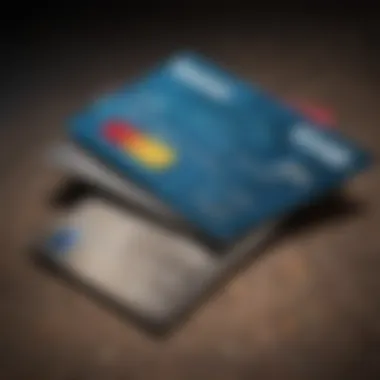Best Prepaid Credit Cards for Building Your Credit Score


Intro
Building credit can seem difficult, especially for those with no credit history. For many individuals, finding financial products that serve as a building block is essential. Prepaid credit cards can uniquely fill this gap. They help manage personal funds and create a path to improving credit scores effectively.
Understanding Credit Scores
Importance of Credit Scores
Credit scores are key indicators of an individual's financial health. They determine the likelihood that a person will repay borrowed money. A high score can lead to better loan offers, lower interest rates, and approved credit applications. Conversely, low scores can create barriers when applying for a loan or securing rental agreements.
Factors Affecting Credit Scores
Several factors influence your credit score:
- Payment history: On-time payments are crucial. Late payments negatively affect your score significantly.
- Credit utilization ratio: This reflects how much credit you’re using versus your available credit. Keeping it below 30% is generally advised.
- Credit history length: A longer credit history owed leads to better scores.
- Types of credit: A mix of different credit sources can improve your score.
- Recent inquiries: Applying for new credit may lower your score without causing long-term harm.
Tips to Improve Credit Scores
Improving your credit score does not happen overnight. However, keeping a few pointers in mind can aid your efforts:
- Pay bills on time.
- Regularly check your credit report for errors.
- Refrain from opening multiple new accounts at once.
- Maintain low balances on existing credit accounts.
Understanding Prepaid Credit Cards
Prepaid credit cards provide a unique option for individuals aiming to build their credit history without the complexities of traditional credit products. Understanding how these cards work is imperative for anyone interested in strengthening their financial standing.
Definition and Functionality
A prepaid credit card functions by loading money onto the card before it can be used for spending. Once the funds are exhausted, additional amounts must be reloaded to facilitate further transactions. Unlike traditional credit cards, which allow users to borrow funds up to a certain limit, prepaid cards require users to spend the available balance only. This makes them an effective tool for budgeting.
When transaction is completed, a prepaid card deducts the amount directly from the balance. Such setup teaches responsibility, as cardholders must spend wisely within their available resources. Thus, without accumulating debt, one can adhere to a particular financial strategy.
Difference Between Prepaid Cards and Traditional Credit Cards
There are critical differences between prepaid cards and traditional credit cards. First, prepaid cards are not linked to ongoing credit lines. This means they do not contribute to debt or lead to interest costs, conditions often associated with traditional credit options.
Second, prepaid cards usually do not require a credit check or income verification, making them accessible to anyone, regardless of credit history. In contrast, traditional credit cards assess an individual's creditworthiness using established credit scores.
Moreover, prepaid cards may not offer credit limit increases or promotional perks typically attached to traditional credit accounts. Understanding these distinctions enables consumers to choose the product fitting their needs.
How Prepaid Cards Impact Credit Scores
Importantly, prepaid cards, by their nature, do not directly affect one's credit score. Since these cards do not involve borrowing, the activity with them does not get reported to major credit bureaus. Hence, one can make purchases without receiving credit for that activity on their credit history.
However, some specific prepaid options have the capability to report financial activity to credit bureaus. This can assist consumers in establishing a positive credit profile when used correctly, as the payment behavior is documented over time.
Building credit involves various strategic efforts. Using these specialized prepaid cards responsibly, making adequate deposits, and ensuring consistency can develop a solid foundation for greater financial flexibility in the long run.
“Understanding how each card functions is essential for poised credit growth.”
Knowledge about managing financial tools like prepaid cards lays groundwork necessary for consumers embarking on the journey of credit expansion.
Benefits of Using Prepaid Credit Cards
Prepaid credit cards serve several noteworthy purposes that can enhance financial management and credit building. Understanding these benefits can help individuals make informed choices regarding their credit strategies. Prepaid cards are designed to provide users with convenience, security, and a means to foster a positive credit narrative.
Control Over Spending


One of the primary advantages of prepaid credit cards is the control they offer over spending. Users can load a specific amount of money onto the card, which effectively limits their spending to that preloaded balance. This method of budgeting mitigates the propensity to overspend, a common challenge associated with traditional credit cards. By adopting such a practice, individuals gain insights into their finances, developing better money management skills over time.
Moreover, prepaid credit cards function well for those still learning financial responsibility. Clear boundaries are established, preventing anyone from incurring high debts. This fosters a disciplined approach to expenses, which can be particularly beneficial for young adults or those new to credit.
Lower Risk of Debt Accumulation
In the current financial landscape, information regarding debt series litter various financial advisories. Individuals often struggle to maintain balances more than they can manage. Prepaid credit cards present a practical solution to this dilemma by inherently preventing users from borrowing. Since there is no line of credit, it reduces the risk of debt accumulation entirely.
Each expenditure made on a prepaid card is supported by actual available funds. Thus, even impulsive decisions feel safe for users since they cannot overspend. This instills a mindful approach regarding one's resources and their availability at any moment, helping to foster responsible financial behavior without falling into debt traps.
Potential for Building Credit History
Although prepaid cards do not operate like traditional credit cards, certain brands offer the ability to report spending to credit bureaus. Choosing the right card can lead to effective credit building if utilized correctly.
By consistently loading funds and spending within limits, users develop a discoverable transaction history, which may enhance their credit profiles. This knowledge, along with the card’s specific features, helps users actively engage in their financial growth. Many issuers clearly outline their reporting capabilities, allowing the user to make educated decisions about which prepaid cards to select.
Always confirm if the issuer reports to credit agencies before choosing your prepaid card. Sometimes, benefits are not guaranteed without enforced guidelines around credit evolution.
Selecting the Best Prepaid Credit Card
Choosing a prepaid credit card can be a pivotal step for individuals who want to build their credit without taking on significant debt. Not all prepaid cards are created equal, and understanding what to look for can make a substantial difference in achieving one's credit goals. This section will explore key factors such as fees, reporting practices, and card features that are crucial when selecting the ideal card for credit building.
Assessing Fees and Charges
Understanding the fees associated with prepaid credit cards is essential. Fees can vary greatly between different cards. Common fees to consider include:
- Activation fees: Some cards charge a fee for initial setup.
- Monthly maintenance fees: Ongoing fees just for holding the card, which can eat into your balance.
- Transaction fees: Charges that apply when you make purchases or withdraw cash.
Examining these fees helps one select a card that minimizes costs and maximizes the funds available for spending. Do not forget to read the fine print. Every financial service provider displays fee terms in often overlooked documents, and a meticulous review can avoid surprises later on.
Finding Cards That Report to Credit Bureaus
A critical aspect of using prepaid credit cards to build credit is ensuring the card issuer reports your activity to one or more of the major credit bureaus—TransUnion, Experian, or Equifax. This reporting is vital as it will affect your credit score. Here are factors to consider:
- Inquire directly: Before committing, ask if the card issuer reports to credit bureaus.
- Research reviews: Look at reviews or discussions on platforms like Reddit or personal finance blogs for user feedback that confirms whether the card issuer follows through on reporting.
- Compare options: Not all issued cards will affect your credit score positively, and selecting well-informed can direct you toward enhanced credit history.
By carefully choosing cards that do report, consumers can simulate a traditional credit-use scenario, leading to friendliness between their behaviors and potential lenders in future environments.
Evaluating Card Features and Benefits
Finally, evaluating the specific features and benefits of prepaid credit cards can enhance overall user experiences. Some beneficial features to consider include:
- Rewards programs: Some cards offer cash back or points for purchases. While rarer in prepaid cards, they do exist.
- Reviewing limits: Knowing the spending thresholds on a card helps in budget grooming.
- Mobile app accessibility: Some providers offer user-friendly apps that allow you to easily track expenses or reload the card.
By considering these features, users not only select cards that manage their money better, but they also find tools that support their journey toward improved credit scores comprehensively.
Taking thoughtful steps when selecting the most suitable card can enhance users' financial clarity and growth. Focus on understanding every aspect, as knowledge leads to better decisions.
Emphasizing deep analysis over superficial offers will ensure that readers are effectively positioned in the intricate landscape of personal finance and credit building.
Maximizing the Benefits of Prepaid Credit Cards
Optimizing the advantages of prepaid credit cards is crucial for those who aim to enhance their credit scores. Many individuals overlook the full potential of these financial tools. One important aspect is understanding that, when used wisely, prepaid cards can be conducive to developing a positive credit profile. Therefore, focusing on effective strategies is essential. Here are some elements to consider for making the most of prepaid credit cards.
Establishing a Budget
Establishing a budget is a foundational step in maximizing the benefits derived from prepaid credit cards. A well-defined budget allows users to set limitations on their spending. It's critical not only to monitor expenditures but also to align these expenditures with personal financial goals.
- Determine monthly income.
- List essential expenses.
- Allocate funds specifically for card use.


Using prepaid cards within the confines of this framework can offer a clearer understanding of financial habits. It aids the cardholder in prioritizing needs over wants. Adhering to the budget mitigates overspending, enabling one to keep track of financial flow more efficiently.
Routine Monitoring of Spending Habits
Regularly analyzing spending habits is vital to leverage the advantages of prepaid credit cards. By continuously assessing where funds are allocated, users can identify unnecessery expenditures that erode financial stability.
Benefits of routine monitoring include:
- Understanding spending patterns.
- Adjusting budgets accordingly.
- Identifying opportunities for saving.
Furthermore, several prepaid card services feature accompanying apps or online access that facilitate this awareness. Gaining insights into specific purchases could highlight trends, such as impulse buying or reliance on frequent culture-driven expenditure.
Timely Reloading of the Card
Maintaining a suitable balance on a prepaid card is equally important for maximizing its benefts. This feature ensures seamless transactions and optimal usage without undisclosed barriers, such as declined payments due to insufficient funds.
Prompt reloading can provide the following advantages:
- Ensures readiness for unexpected payments.
- Eliminates risks associated with cash-based transactions.
- Supports a consistent flow of activity, crucial for reporting purposes related to credit history.
By establishing a reloading schedule, cardholders maintain balances that align with their budgetary demands.
Using prepaid cards strategically encourages mindful spending and can lead to credit improvement, provided the cardholder is diligent in their approach to managing these tools.
Common Pitfalls to Avoid
The journey to building credit through prepaid credit cards involves more than just selecting the right card. There are common pitfalls users frequently encounter that can undermine their efforts. It is essential to be aware of these missteps in order to maximize the advantages of prepaid cards. Understanding these pitfalls can lead to a more successful credit-building experience.
Ignoring Fees and Charges
Every prepaid credit card comes with its own set of fees. While the advantages may seem straightforward, improperly understanding these fees can cause unexpected expenses. Charges such as activation fees, monthly maintenance fees, transaction fees, and reload fees can accumulate quickly. Measuring the overall cost of maintaining the card is crucial before making a commitment.
Users often make the mistake of not reading the terms and conditions thoroughly. Many cards tout “no monthly fees,” yet impose charges that are not immediately apparent. Be sure to ask about hidden charges. Ignoring fees could easily erode the benefits one might gain by using a prepaid card as a path to improved credit scores.
Overlooking Reporting Practices
Not all prepaid credit cards report to the major credit bureaus. This is a critical facet often overlooked by users. If a card does not report, then any payment history will not contribute to one’s credit profile. Selecting a card that actively reports is paramount. Always verify whether your card of choice sends payment data to agencies such as Experian, TransUnion, and Equifax.
A contract that lacks reporting to credit bureaus minimizes the effectiveness of the card as a credit-building tool. Even if one takes selective actions to manage their card responsibly, it won't influence their credit score positively if there's no acknowledgment from reporting agencies. This oversight can stifle credit progression and ultimately contradict the intention behind using the card in the first place.
Failure to Review Credit Reports
Frequent review of your credit report is a practice many users neglect. After starting with a prepaid credit card, it is vital to periodically check your credit report for any inconsistencies or inaccuracies that may arise. Manually process the data accessible at annualcreditreport.com can provide invaluable insights about one's credit standing.
Notate the changes in your credit score over time, especially after positive actions such as timely payments. If there's no discernible improvement, one must pause and evaluate. Track how the prepaid card influences your scores and adjust accordingly based on findings. A proactive approach towards reviewing credit reports not only ensures accuracy but also empowers users to take informed action for better outcomes.
The road to credit improvement is nuanced, but missing these pitfalls can keep you on track.*
Alternatives to Prepaid Credit Cards
Considering the role of prepaid credit cards in credit building, it is vital to acknowledge that they are not the only option available. Alternatives such as secured credit cards and standard unsecured credit cards can also serve similar purposes, offering unique benefits and considerations. Each pathway has its advantages that merit exploration. Understanding these options allows individuals to take informed decisions about their credit journey.
Secured Credit Cards
Secured credit cards are among the most effective alternatives to prepaid cards for those looking to build a credit history. These cards require a cash deposit that serves as security for the issued credit line, which typically equals the deposit amount.
This setup makes secured cards less risky for issuers, often resulting in better approval rates, even for individuals trying to rebuild their credit.


Some key aspects of secured credit cards include:
- Credit Reporting: Most secured cards report to the three major credit bureaus, Assisting in improving your credit score over time.
- Limits on Spending: The credit limit is usually equal to the deposit, aiding mindful financial staying within means.
- Transition to Unsecured Credit: Many issuers will reassess your profile after responsible use. A strong record can lead to upgrades to an unsecured card.
However, it’s essential to note tha handling consistently lower credit limits while managing outstanding balances diligently is also part of their utilization strategy.
Standard Unsecured Credit Cards
Standard unsecured credit cards represent another viable alternative. Unlike their secured counterparts, unsecured cards do not require a cash upfront deposit. Instead, you are deemed to be creditworthy enough to handle credit directly. For individuals who may qualify, this option can simplify usage.
Key things to consider with unsecured cards include:
- Variety of Options: There are numerous unsecured cards with varying reward structures, interest rates, and fees, allowing users to choose one that fits their spending habits.
- Credit Limit Flexibility: Many unsecured cards start at a higher credit limit, potentially giving users more financial freedom.
- Sign-Up Bonuses: Some cards offer attractive sign-up bonuses, creating incentives for good user behavior.
Yet, it’s critical to approach unsecured credit responsibly. Higher limits can likewise lead to more significant potential pitfalls if spending spirals out of control.
It is important to evaluate the advantages of both secured and unsecured credit cards based on personal needs and possible credit qualifications.
Case Studies: Success Stories
User Experience and Credit Improvement
The value of personal anecdotes in understanding how prepaid credit cards influence credit scores cannot be overlooked. Paying attention to individual experiences brings clarity to the topic of improving credit through pragmatic decisions.
For instance, many users report structure and responsibility when utilizing prepaid credit cards as financial management tools. Samantha, a 27-year-old professional, shared her story of anxiety around credit scores. After opening a prepaid card, her approach towards her personal finances shifted. She began budgeting more effectively, knowing her spending would directly impact her reloadable balance. A notable change in Samantha’s score reflected her responsible journey towards improved creditworthiness.
Key takeaways from this user experiences include:
- Prepaid cards can instill fiscal discipline leading to better credit outcomes.
- Tracking spending on these cards illustrates the real impacts on credit scores.
- Users noted confidence increases as they saw measurable improvements.
It’s clear users like Samantha show that step towards engagement with prepaid cards gives confidence and progress. If used with diligence, users have the potential not only to manage spending effectively but also foster growth in their credit scores over time.
Analysis of Credit Score Progression
Examining how prepaid cards affect credit score progression reveals significant truths. Users have reported notable shifts in their credit scores once established habits around these cards are formed. When it comes down to it, regularly reloading and using a prepaid card offers valuable first steps toward understanding credit complexities.
In a collective analysis of various user experiences, recommended practices show that engagement with prepaid cards leads to measurable benefits such as:
- Increased awareness of spending habits, giving users insights on their financial decisions.
- Time and usage patterns lead to improved habits, ultimately reflecting in better credit scores accumulatively over a few months.
- Continuous use reveals trends indicating reliance and increased familiarity with financial wellness, encouraging sustained improvement.
Information from such analyses indicate the vital link between responsible prepaid card use and positive credit progression warming hearts of hesitant new users.
By leaning into the structured lessons displayed in user progression, there emerges a consciousness of removing fear from personalized debt resolution. A diligent user can look forward to a significant positive shift if they approach prepaid cards with proper intention and care. The stories drive home the belief that overcoming challenges requires both precise technique and informed decisions.
Finale
Understanding the role of prepaid credit cards in building credit scores is vital for those seeking a strong financial foundation. These cards offer unique advantages, such as avoiding debt and effectively tracking spending. Unlike traditional credit cards, prepaid options can prevent overspending because users can only spend what they load onto the card.
In this article, several key components were explored regarding prepaid credit cards. This includes how to select the right card, the importance of card features, and how these cards may positively influence credit scores if reported to bureau agencies. Moreover, the comparison of prepaid cards with other forms of credit helps clarify which method may suit various financial situations better.
"Prepaid credit cards can bridge the gap towards better credit scores, providing a stepping stone towards greater financial opportunities."
Proactively managing the use of prepaid credit cards leads to credit improvement. They must be utilized effectively and monitored closely. Users should also be alert to pitfalls like fees and the importance of routine credit report reviews to gauge progress.
Recap of Key Points
- Features of Prepaid Cards: Basic functionality involves using loaded funds without incurring debt.
- Benefits: Help control spending, lower the risk of debt, and can assist in building a potential credit history if reported.
- Choosing Wisely: Evaluate fees, opt for cards that report to credit bureaus, and weigh the features against personal financial goals.
- Maximizing Use: Establish budgets, monitor spending habits, and ensure the card is reloaded timely to avoid unwelcome limits.
- Pitfalls to Consider: Always check for hidden fees, verify if the card reports usage to credit agencies, and regularly review personal credit reports for accuracy.
Final Recommendations
For individuals aiming to enhance their credit scores, adopting a strategic approach with prepaid credit cards is suggested. Here are steps to follow:
- Conduct In-Depth Research: Look for cards that not only have favorable features but also report usage to major credit bureaus such as TransUnion and Experian.
- Consider a Routine Financial Check-Up: Review your financial habits regularly to ensure effective utilization of the prepaid card to maximize its benefits for credit building.
- Diversify Credit Exposure: Consider supplementing prepaid cards with other credit loss reduce methods, including secured credit cards, to have varied forms of credit reporting in your profile.
By following these guidelines, users can adopt a more robust approach in their journey to build a positive credit history. Eventually, this will lay down a solid ground for future credit possibilities and better financial management.



